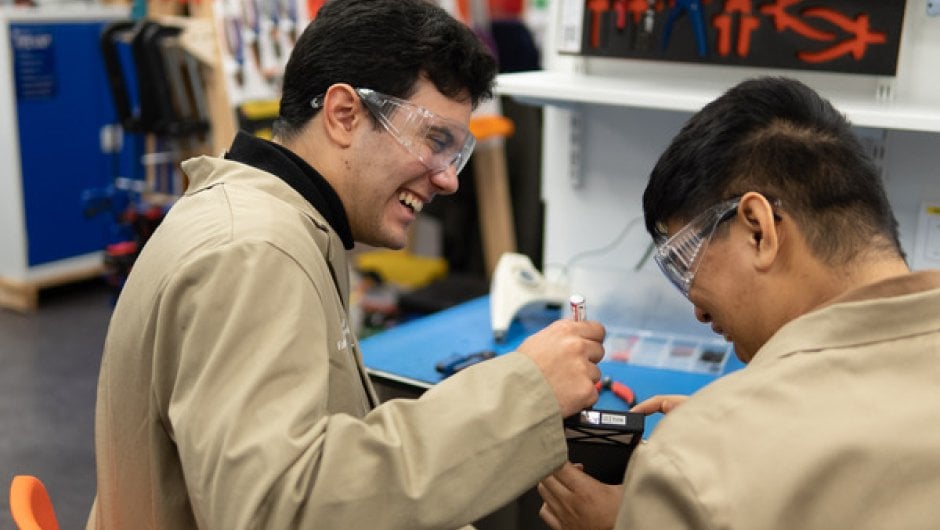Mechanical engineering is an innovative subject that looks at the design, analysis, and manufacturing of systems that keep our world moving forward. It goes beyond nuts and bolts, diving into topics like fluid dynamics, thermodynamics, and materials science.
The career opportunities span industries such as aerospace, automotive, energy, and robotics. Just some of the roles include design engineers, project managers, or research and development leaders, where professionals contribute to creating sustainable solutions in machinery.
Mechanical engineering is not just about machines; it also develops skills such as problem-solving, creativity, and a deep understanding of physical principles that will shape the future of technology and innovation.
The impact you could make
- Be at the forefront of technological innovation, contributing to the development of new machines and systems.
- Play a role in the design of energy systems, including renewable energy sources such as wind, solar, and hydropower.
- Ensure the safety, durability, and efficiency of critical structures that support communities.
What you could study
- Structural materials
- Engineering concepts
- Solid mechanics
- Thermodynamics
- Thermofluids
- Biomedical and bioengineering
- Electromechanicals
- Systems modelling
Study options
Chat to a current mechanical engineering student
Chat to a current mechanical engineering student using UniBuddy.
Some conversation starters for you:
- Ask which modules they really enjoyed.
- Find out how easy it was for them to make friends on their course.
- Do they have any tips on your personal statement?
- Did they do anything to prep for uni before they went?
- Are there books, podcasts or YouTube channels they would recommend?
Example module
Example project
Subjects it's useful to have studied first
Some mechanical engineering courses or apprenticeships will have requirements for previous qualifications in certain subjects. Entry requirements vary, so always check with the provider.
Physics
Maths
Design technology
Computing
Other sciences
Hard skills you'll develop
- Understanding of the properties of different materials
- Knowledge of machine elements, mechanisms, and the physics of mechanics
- Understanding of control theory
- Knowledge of mechanical vibrations
Soft skills you'll develop
- Collaboration and teamwork
- Problem-solving
- Project management
- Patience and persistence
Careers: Where it can take you
Find out more about your career prospects from studying mechanical engineering. The following information is based on a typical mechanical engineer role.
Available jobs
Average salary
Career options

What is a… renewable energy consultant?
A renewable energy consultant is a forward-thinking professional dedicated to advancing sustainable energy solutions. Their expertise in renewable energy technologies is used to advise businesses and governments on the implementation of environmentally friendly and economically viable energy projects. Renewable energy consultants do studies, assess energy needs, and recommend tailored solutions such as solar, wind, and hydropower installations. By offering strategic guidance and technical expertise, renewable energy consultants play an important role in a greener energy future, contributing to the global efforts to combat climate change and create a more sustainable and resilient energy infrastructure.
Find your ideal career
Take our careers quiz to find your ideal job matched to your personality type.Getting in: Entry requirements
Find out more about what you'll need to study mechanical engineering at university or as an apprenticeship.
Average requirements for undergraduate degrees
Entry requirements differ between university and course, but this should give you a guide to what is usually expected from mechanical engineering applicants.
A levels
Scottish Highers
Vocational

Mechanical engineering
Check out our industry guide to help you decide if a mechanical engineering apprenticeship might be the right choice for you.Let’s talk about... engineering apprenticeships
Not sure if a traditional degree is for you? Listen to our new podcast to learn more about studying degree apprenticeships in engineering.
Considering an apprenticeship?
Applying for an apprenticeship is just like applying for a normal job. Here’s what you need to know:
-
1
Deadline
Apprenticeships don't follow the same deadlines as applying to uni, the deadline is down to the employer. -
2
Where to apply
You apply directly through the employer. -
3
No limits
You're not restricted to one apprenticeship application; you can do as many as you like. -
4
Apply to university and apprenticeships
There's nothing stopping you applying to university through UCAS, while also applying for apprenticeship vacancies. -
5
Find out more

Apprenticeship vacancies
Check out live apprenticeship vacancies in mechanical engineeringExplore further
Go deeper into topics around mechanical engineering with the following:
-
1
Engineering Design Show
Have a day out at the UK’s biggest show dedicated to mechanical, electronics and embedded design. -
2
Hackaday – an online engineering community
Hackaday offers – you guessed it – hacks, from engineering enthusiasts around the world. You can enter contests, read about the latest builds and inventions, and even take some courses. -
3
TED talks
Depending on your specific interests, you can find lots of available TED talks around engineering. -
4
Keep up-to-date with the latest news
You'll find all the latest news and research on The Institution of Engineering and Technology website.
76% of students
Application advice
Whether it's personal statement tips or what to write in a cover letter for an apprenticeship application, our advice will help you get ahead in your mechanical engineering journey.Skills, experiences, and interests to mention
- Have you always been curious about mechanical systems and how they work? A curious mind is great in mechanical engineering.
- Do you have any thoughts on applying mechanical engineering principles to sustainable technologies?
- Your academic achievements, particularly in maths, physics, and any engineering-related subjects, will be really important when you’re applying for a mechanical engineering course.
- If you have experience with CAD software, and in creating 2D and 3D models, mention any projects where you used CAD for design and visualisation.
- Talk about your problem-solving skills and your ability to approach challenges with creativity and a systematic mindset.


